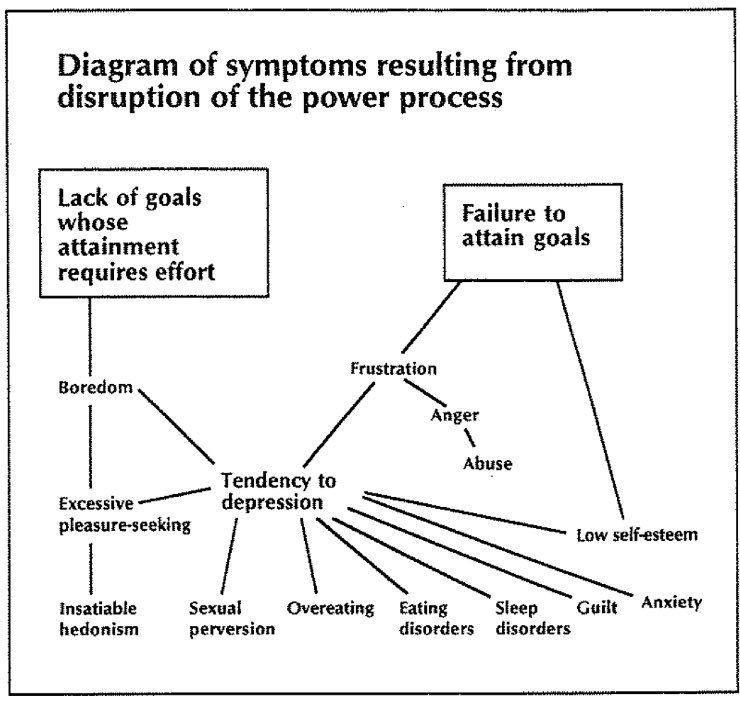
論工業社會及其未來-43
43
It is true that some individuals seem to have little need for autonomy. Either their drive for power is weak or they satisfy it by identifying themselves with some powerful organization to which they belong. And then there are unthinking, animal types who seem to be satisfied with a purely physical sense of power (the good combat soldier, who gets his sense of power by developing fighting skills that he is quite content to use in blind obedience to his superiors).
◈
44
But for most people it is through the power process—having a goal, making an AUTONOMOUS effort and attaining the goal—that self-esteem, self-confidence and a sense of power are acquired. When one does not have adequate opportunity to go through the power process the consequences are (depending on the individual and on the way the power process is disrupted) boredom, demoralization, low self-esteem, inferiority feelings, defeatism, depression, anxiety, guilt, frustration, hostility, spouse or child abuse, insatiable hedonism, abnormal sexual behavior, sleep disorders, eating disorders, etc. [6]
[6] Some of the symptoms listed are similar to those shown by caged animals.
To explain how these symptoms arise from deprivation with respect to the power process:
Common-sense understanding of human nature tells one that lack of goals whose attainment requires effort leads to boredom and that boredom, long continued, often leads eventually to depression. Failure to attain goals leads to frustration and lowering of self-esteem. Frustration leads to anger, anger to aggression, often in the form of spouse or child abuse. It has been shown that long-continued frustration commonly leads to depression and that depression tends to cause guilt, sleep disorders, eating disorders and bad feelings about oneself. Those who are tending toward depression seek pleasure as an antidote; hence insatiable hedonism and excessive sex, with perversions as a means of getting new kicks. Boredom too tends to cause excessive pleasure-seeking since, lacking other goals, people often use pleasure as a goal. See accompanying diagram.
The foregoing is a simplification. Reality is more complex, and of course, deprivation with respect to the power process is not the ONLY cause of the symptoms described.
By the way, when we mention depression we do not necessarily mean depression that is severe enough to be treated by a psychiatrist. Often only mild forms of depression are involved. And when we speak of goals we do not necessarily mean long-term, thought-out goals. For many or most people through much of human history, the goals of a hand-to-mouth existence (merely providing oneself and one’s family with food from day to day) have been quite sufficient.
◈
43
確實有些人似乎不太需要自治。若不是他們對權力的渴求很薄弱,就是他們從自身和一些強大組織的認同感中得到滿足。然後還有一些不思考、動物般的人似乎純粹肉體的權力感就能使他們滿足(好的戰鬥士兵從發展他頗具信心的戰鬥技術以盲目服從上級獲得權力感。)
◈
44
但對大多數人來說是透過權力進程—有目標、通過自主的努力並獲得目標—獲得自尊、自信和權力感。當一個人沒有足夠的機會去歷經權力進程,結果會是(依不同個體及權力進程被阻礙的方式有所不同)無聊、意志消沉、低自尊、自卑感、失敗主義、抑鬱、焦慮、罪惡感、沮喪、敵意、家暴、無盡的享樂主義、不正常的性行為、睡眠障礙、進食障礙等等。[6]
[6] 有些這裡所列的徵狀和籠中動物所表現的相似。
解釋這些徵狀如何從權力進程匱乏而產生:
從對人性的常識了解,缺乏需要努力才能達成的目標會導致無聊,而長期持續的無聊經常最終導致抑鬱。未能達成目標會導致挫折及降低自尊。挫折導致憤怒,憤怒導致侵略行為,通常是以家暴形式表現。證據顯示長期持續的挫折普遍導致抑鬱,而抑鬱往往導致罪惡感、睡眠障礙、進食障礙和對自身的不良感受。那些傾向抑鬱者尋找歡愉作為解藥;因此導致無盡的享樂主義和過度性生活,變態行為作為得到新刺激的手段。無聊往往亦會導致過度追求歡愉,因為缺乏其它目標,人們經常以歡愉為目標。參見附圖。
前述是簡化的。現實更加複雜,且當然,權力進程的匱乏不是這裡描述的徵狀的唯一成因。
附帶一提,當我們提到抑鬱,我們不一定是指嚴重到需要精神科醫師治療的抑鬱。通常僅有輕微程度的抑鬱。而當我們說到目標,我們不一定是指長期的、深思熟慮的目標。對人類歷史中許多人甚至是大多人,勉強餬口(僅僅提供自己和自己的家庭的日常食物)的目標已經十分足夠。
◈
「有些這裡所列的徵狀和籠中動物所表現的相似。」
Kaczynski 替代性活動、權力進程和自治的章節和 Desmond Morris 的 The Human Zoo 有相似的思維。工業-科技體系的人們和動物園的動物都有相似之處:基本生存不費吹灰之力,但付出的代價是活在一個「不自然」的環境,導致許多心理問題。

喜欢我的文章吗?
别忘了给点支持与赞赏,让我知道创作的路上有你陪伴。
发布评论…